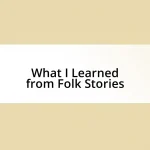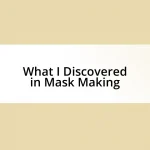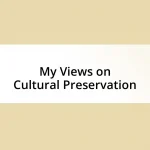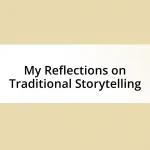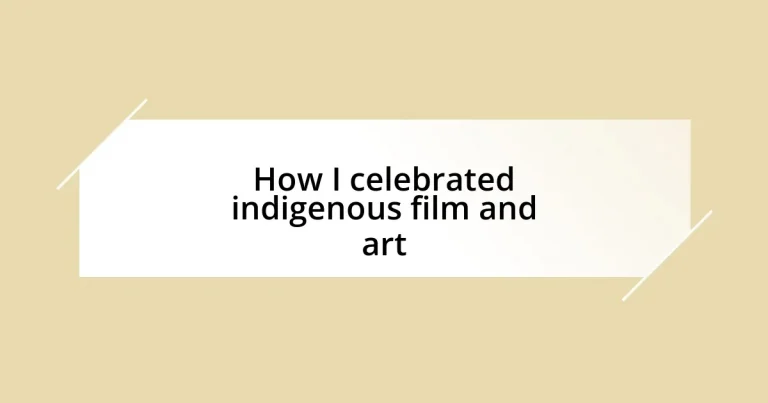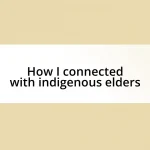Key takeaways:
- Discovery of indigenous films ignited a passion for storytelling and understanding cultural identities.
- Engaging with indigenous art deepened appreciation for creativity as a form of resistance, resilience, and cultural heritage.
- Community screenings and workshops fostered meaningful connections and dialogues around shared stories and histories.
- Supporting indigenous artists directly promotes relationship-building and elevates their narratives within the broader cultural landscape.
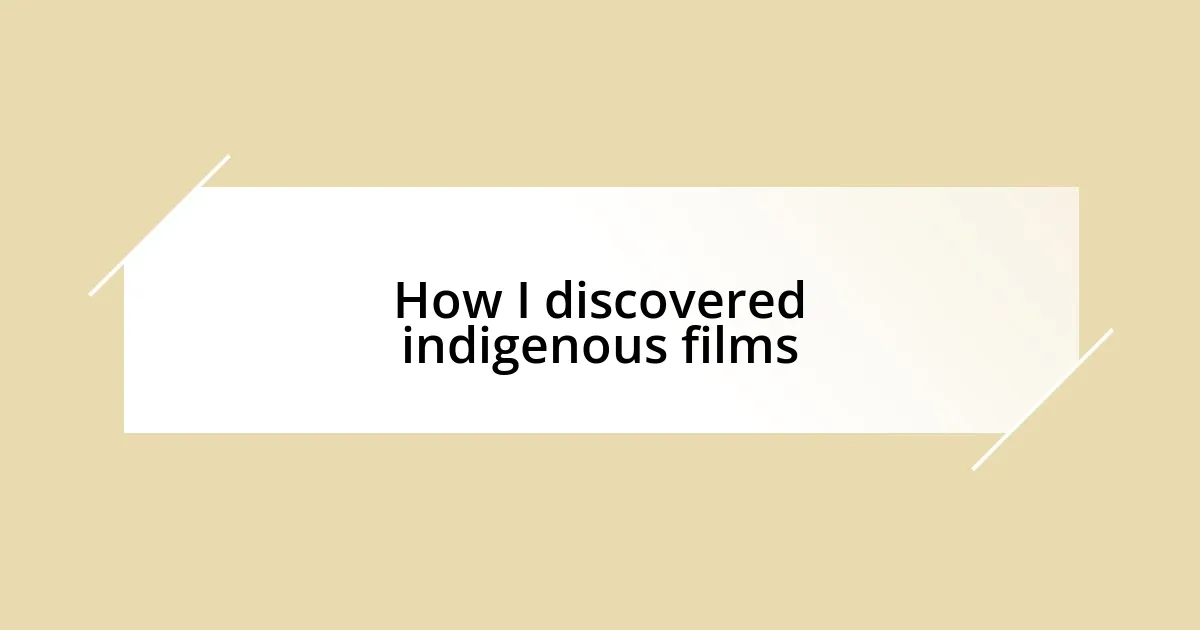
How I discovered indigenous films
My journey into the world of indigenous films began quite unexpectedly. I stumbled upon a film festival showcasing indigenous narratives while exploring my city one weekend. Curious about these stories that resonated with themes of identity and culture, I decided to buy a ticket. Can you remember the moment you first felt a deep connection to a film? That’s exactly how it felt for me.
As I settled into my seat, the lights dimmed, and the screen came alive with vibrant visuals and heartfelt stories. I was captivated by the way the filmmakers portrayed their experiences—raw and authentic. One film, in particular, touched me deeply; it was about a young woman reclaiming her heritage after years of cultural disconnection. I couldn’t help but reflect on my own roots, and I wondered how often we overlook our own stories amid the noise of mainstream media.
After that night, I found myself seeking more of these films, diving into the rich history and culture that was bursting from the screen. I remember talking to a filmmaker afterward; her passion for storytelling ignited something within me. It became clear: indigenous films are more than just entertainment; they’re bridges to understanding diverse perspectives. Have you ever felt that urge to share a story that must be heard? That’s what indigenous cinema ignited in me.
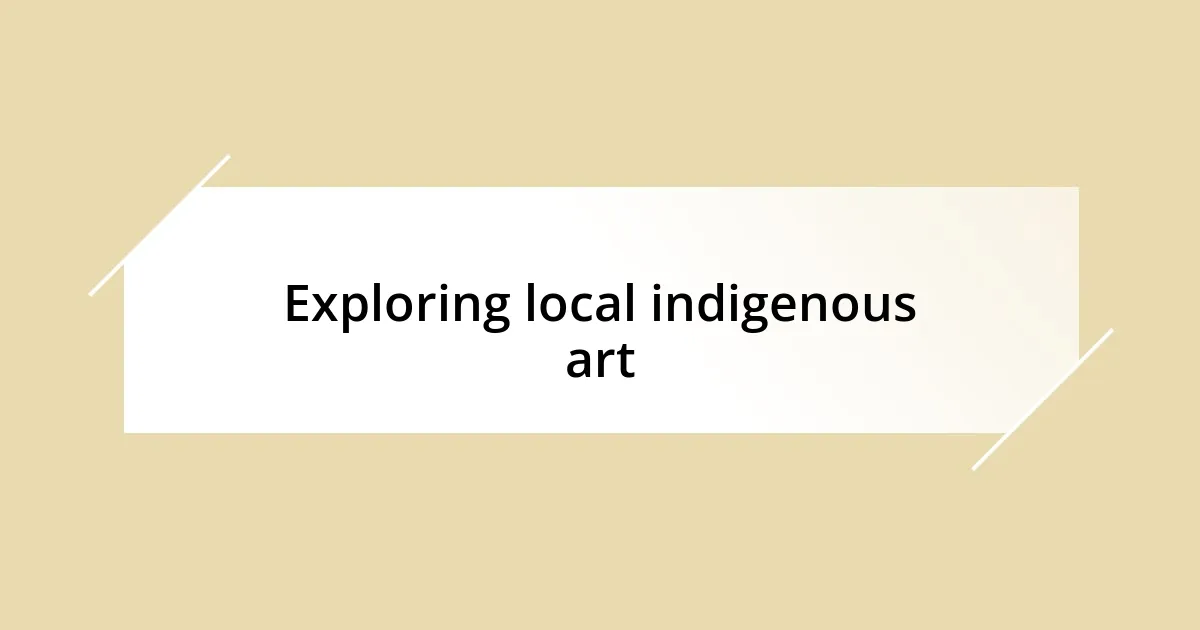
Exploring local indigenous art
When I first ventured into the local galleries showcasing indigenous art, I was immediately struck by the profound connection between the artists and their ancestors. Each piece told a story imbued with cultural significance, reflecting centuries of tradition and wisdom. I remember standing before a stunning mural that depicted a creation story; it was mesmerizing how the colors and patterns seemed to dance, pulling me into its narrative. Have you ever found yourself lost in a piece of art that spoke directly to your soul? That’s the experience I had.
Exploring indigenous art has deepened my appreciation for creativity as a form of resistance and resilience. Many artists use their work to reclaim their identities and share their perspectives. I was particularly moved by a series of sculptures made from reclaimed materials, which highlighted themes of environmental stewardship and cultural survival. What struck me was not just the beauty of these pieces but the message that art can serve as a powerful medium for advocacy and awareness. Have you ever felt inspired to take action after seeing a piece of art?
This journey into local indigenous art has not only expanded my horizons but has also fostered a sense of community. Engaging with artists and their work created room for dialogue around cultural histories and contemporary issues. I remember attending an artist’s talk that turned into an enlightening discussion on the importance of preserving indigenous languages through visual art. It made me realize that every brushstroke carries the weight of survival and hope for future generations.
| Art Form | Significance |
|---|---|
| Paintings | Often depict historical narratives, blending traditional storytelling with modern techniques. |
| Sculptures | Utilize reclaimed materials to promote messages of sustainability and cultural heritage. |
| Textiles | Showcase intricate patterns that signify clan identities and spiritual beliefs. |
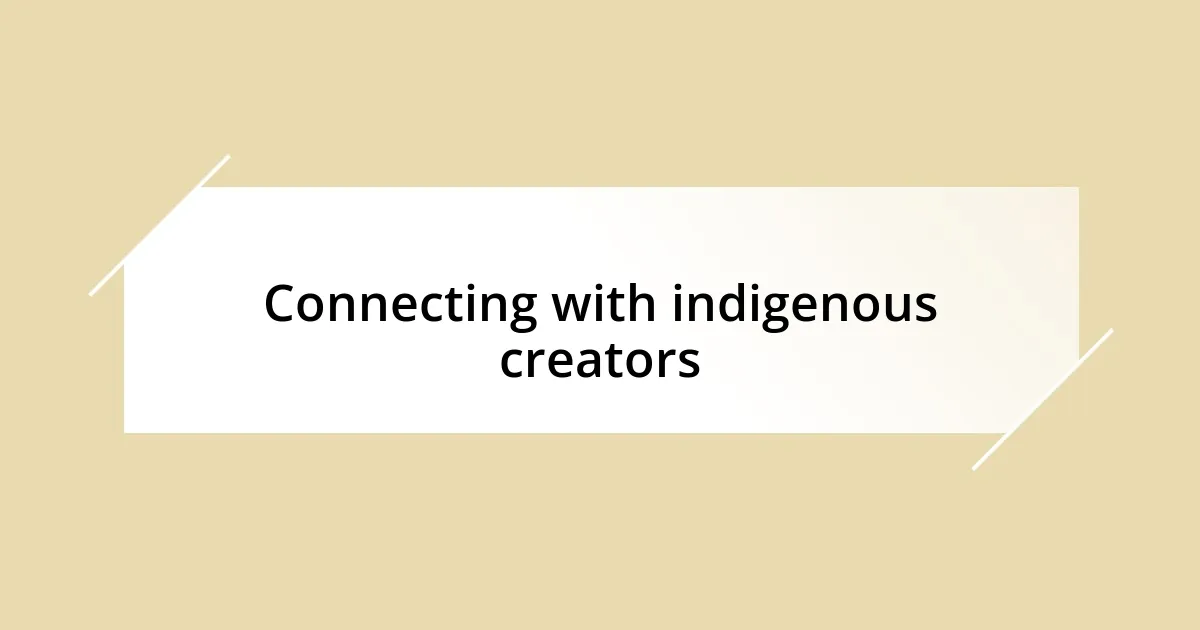
Connecting with indigenous creators
Connecting with indigenous creators has been an enriching experience for me. I remember attending a workshop led by an indigenous filmmaker and being awestruck by how candidly she shared her journey. She spoke about the importance of storytelling in her culture—not just as entertainment, but as a means of preserving history and identity. I felt an overwhelming sense of connection, as if her narratives were also whispering truths about my own journey. It was a moment that highlighted for me how we can find common ground through shared stories regardless of our backgrounds.
I’ve found that engaging with indigenous creators fosters not only understanding but also collaboration. Here’s what I’ve discovered when connecting with them:
- Authentic Voices: Indigenous creators bring unique perspectives that challenge mainstream narratives.
- Cultural Exchange: Opportunities arise for learning and growth as we share our stories and experiences.
- Community Building: Collaborating with indigenous artists often leads to the formation of supportive networks that amplify diverse voices.
- Mentorship: Many indigenous creators are eager to mentor others, fostering the next generation of storytellers and artists.
Each encounter reinforces my belief that art and storytelling serve as profound connections, bridging gaps between cultures and creating lasting bonds.
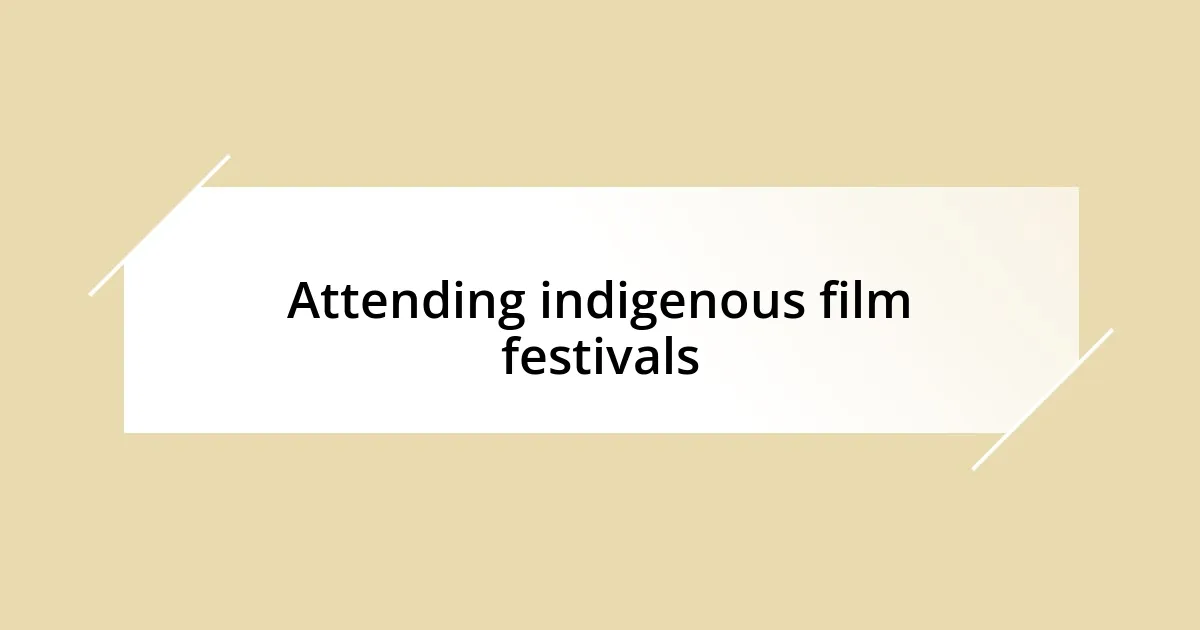
Attending indigenous film festivals
Attending indigenous film festivals has been a transformative experience for me. I vividly recall my first screening at a local festival; the atmosphere was electric, filled with anticipation. As the lights dimmed and the film began, I felt a sense of belonging wash over me. Have you ever been part of a gathering where everyone is united by a shared purpose? That’s exactly how it felt, as if we were all part of a community celebrating our histories and futures together.
The films showcased at these festivals often highlight unique perspectives and untold stories. I remember watching a documentary that followed an indigenous family reconnecting with their land. The visuals were breathtaking, yet it was the emotional journey that truly resonated. It raised questions within me about identity, belonging, and the nature of home. How often do we take the elements of our upbringing for granted? This film reminded me to value the stories that shape us, both individually and as communities.
Engaging in discussions after the screenings has been equally enriching. I distinctly recall a panel where filmmakers shared their creative processes and the challenges they faced in the industry. The candid conversations revealed a commitment to cultural authenticity and social justice, sparking a dialogue that extended beyond the festival itself. I found myself asking, how can we support and elevate indigenous narratives in mainstream media? These moments have deepened my appreciation for the art of storytelling and its power to foster understanding and connection across diverse cultures.
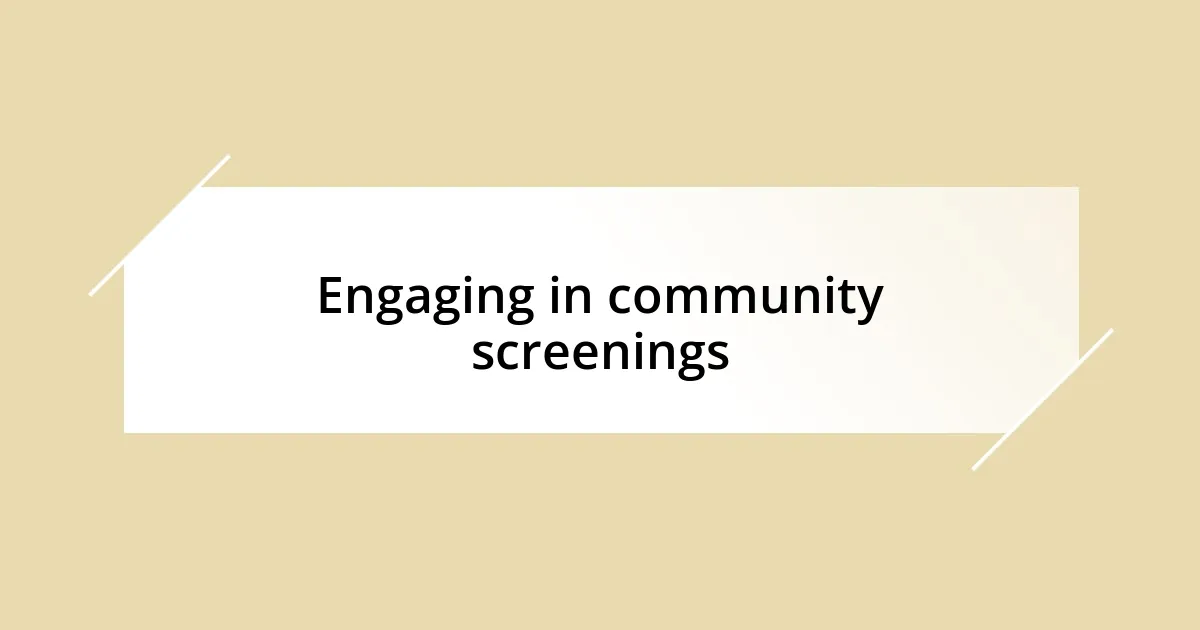
Engaging in community screenings
Engaging in community screenings has offered me a unique lens through which I can experience indigenous storytelling. I still remember the first time I joined a small group for a screening in a local community center. The walls echoed with laughter and shared moments as we all sat together, united by the film weaving its magic. Have you ever felt that sense of community when strangers become friends, all because of a shared story? It was that warmth and connection that made the experience so impactful.
What struck me during these screenings was the diversity of voices that emerged. It wasn’t just about watching a film; it was about engaging in the dialogue that followed. After one screening, a fellow attendee shared a heart-wrenching story about their own cultural roots, encouraging us to reflect on our histories. I found myself wondering, how often do we create spaces for such authentic conversations? These moments of vulnerability and sharing reinforced the idea that through film, we can confront our differences while celebrating our shared humanity.
The atmosphere at community screenings often felt electric, even in quiet moments. I recall a screening where we watched a poignant short film about land reclamation. The air was charged with emotion as many in the audience shared their personal experiences and connections to land. Listening to their stories, I realized how powerful it is to gather and reflect as a community. Isn’t it fascinating how a single film can trigger such profound conversations? These screenings have become more than events; they’ve evolved into sacred spaces for collective healing and understanding.
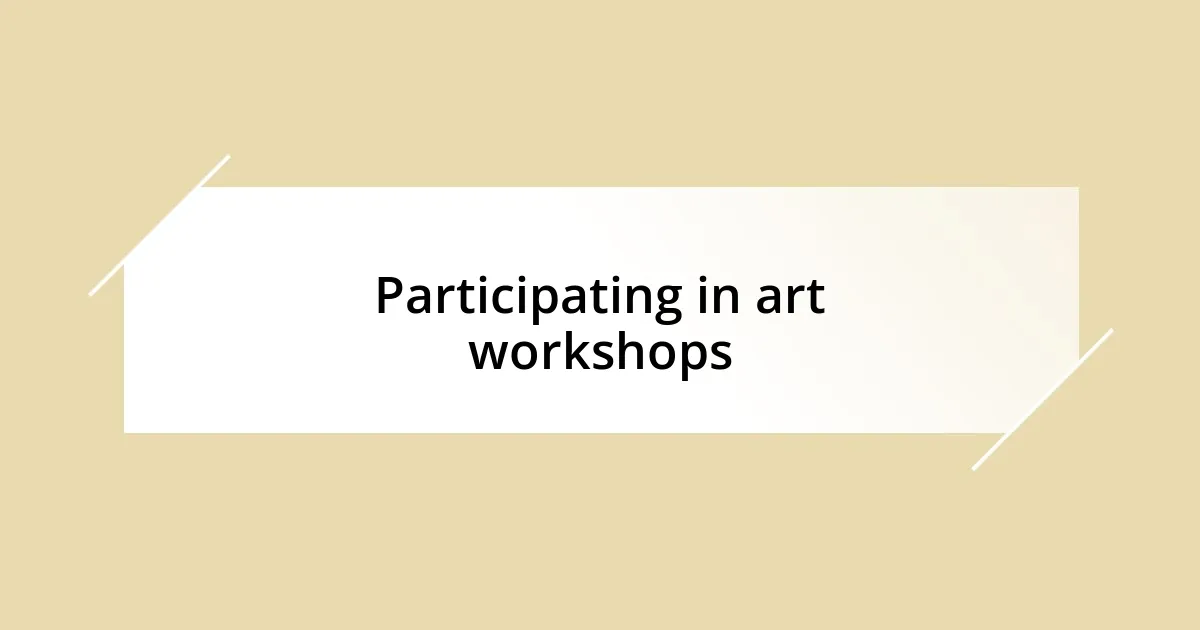
Participating in art workshops
Participating in art workshops has opened new avenues for understanding indigenous culture. I remember stepping into my first workshop, feeling a mix of excitement and curiosity. The moment I picked up a paintbrush, I felt more than just an artist; I was embracing a tradition that echoed with stories and history. Have you ever held a tool that connected you to something greater than yourself? It’s an enlightening experience, one that deepened my appreciation for the intricate art forms that carry the essence of indigenous narratives.
One particular workshop focused on traditional storytelling through visual art. I was paired with a talented indigenous artist who patiently guided me through creating my piece. As we worked side by side, I could see how each stroke meant something profound—from the colors symbolizing nature to the shapes reflecting ancestral stories. I found myself pondering how art can bridge gaps between generations. In that space, I realized my canvas wasn’t just about painting; it was about honoring a heritage that often goes unrecognized.
In another session, we delved into pottery, learning about the significance of specific designs and materials. When I molded the clay, I felt a connection to the earth and its resources, an intimate understanding of what it means to create from the land. It sparked a thought: how often do we take the materials around us for granted? This hands-on experience not only allowed me to create but also prompted me to reflect on the sustainable practices embedded in indigenous art. Each workshop felt like a journey, allowing me to not only express myself creatively but also to engage authentically with the rich tapestry of indigenous culture.
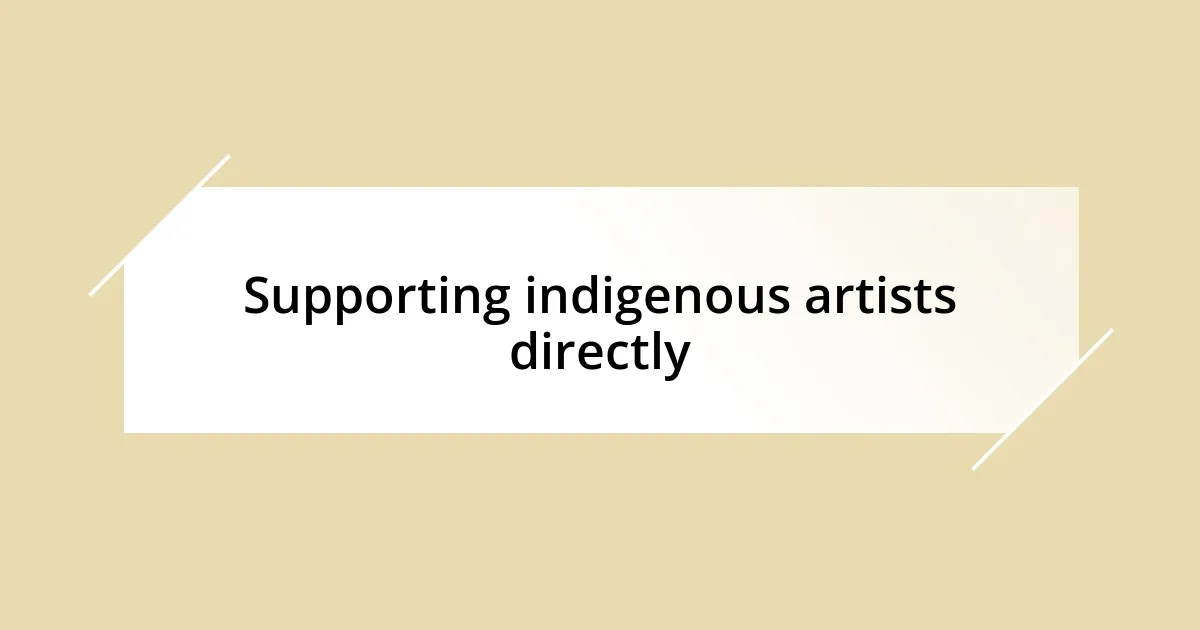
Supporting indigenous artists directly
Supporting indigenous artists directly is about far more than just purchasing their work; it’s about fostering meaningful relationships. I recall visiting a local market where indigenous artists proudly showcased their creations. I struck up a conversation with a woman selling vibrant textiles, each stitch telling a story. Have you ever felt a genuine connection formed over a shared passion? That day, I learned not just about her craft, but also about her community’s history—each piece was a labor of love, deeply rooted in tradition.
On another occasion, I decided to commission a piece from an indigenous artist. The experience was enlightening; we discussed the meaning behind the work and her inspiration drawn from nature. Imagine the joy of collaborating with someone to create something truly unique! This process allowed me to gain insight into her perspective and the importance of preserving cultural expressions—something I previously took for granted. Supporting artists in this way not only empowers them, but also enriches my own understanding of their lived experiences.
Moreover, I’ve noticed that platforms dedicated to indigenous creators are popping up. When I stumbled upon one such platform, I felt a surge of excitement. Here, I discovered an array of art, music, and literature directly from indigenous voices. With every purchase, I knew my support was making a tangible difference. Isn’t it incredible how, with just a few clicks, we can uplift and celebrate the talents of an entire community? This has reinforced my belief that as art lovers, we hold the power to propel indigenous narratives into the limelight, ensuring their stories continue to be heard and cherished.


